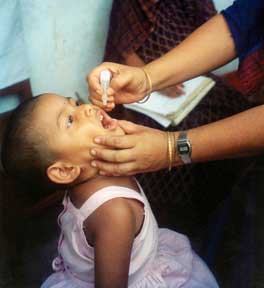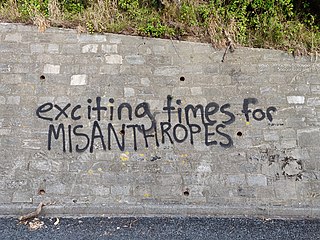
Polio vaccines are vaccines used to prevent poliomyelitis (polio). Two types are used: an inactivated poliovirus given by injection (IPV) and a weakened poliovirus given by mouth (OPV). The World Health Organization (WHO) recommends all children be fully vaccinated against polio. The two vaccines have eliminated polio from most of the world, and reduced the number of cases reported each year from an estimated 350,000 in 1988 to 33 in 2018.

Timaru is a port city in the southern Canterbury Region of New Zealand, located 157 km (98 mi) southwest of Christchurch and about 196 km (122 mi) northeast of Dunedin on the eastern Pacific coast of the South Island. The Timaru urban area is home to 28,900 people, and is the largest urban area in South Canterbury, and the third-largest in the Canterbury Region overall, after Christchurch and Rolleston. The town is the seat of the Timaru District, which includes the surrounding rural area and the towns of Geraldine, Pleasant Point and Temuka, which combined have a total population of 48,900.

Hilary Koprowski was a Polish virologist and immunologist active in the United States who demonstrated the world's first effective live polio vaccine. He authored or co-authored over 875 scientific papers and co-edited several scientific journals.

Temuka is a town on New Zealand's Canterbury Plains, 15 kilometres north of Timaru and 142 km south of Christchurch. It is located at the centre of a rich sheep and dairy farming region, for which it is a service town. It lies on the north bank of the Temuka River, just above its confluence with the Ōpihi River.

Human papillomavirus (HPV) vaccines are vaccines that prevent infection by certain types of human papillomavirus (HPV). Available HPV vaccines protect against either two, four, or nine types of HPV. All HPV vaccines protect against at least HPV types 16 and 18, which cause the greatest risk of cervical cancer. It is estimated that HPV vaccines may prevent 70% of cervical cancer, 80% of anal cancer, 60% of vaginal cancer, 40% of vulvar cancer, and show more than 90% effectiveness in preventing HPV-positive oropharyngeal cancers. They additionally prevent some genital warts, with the quadrivalent and nonavalent vaccines that protect against HPV types HPV-6 and HPV-11 providing greater protection.

Joanne Gay Goodhew is a New Zealand politician. She served as a member of Parliament between 2005 and 2017.
Vaccination and religion have interrelations of varying kinds. No major religion prohibits vaccinations, and some consider it an obligation because of the potential to save lives. However, some people cite religious adherence as a basis for opting to forego vaccinating themselves or their children. Many such objections are pretextual: in Australia, anti-vaccinationists founded the Church of Conscious Living, a "fake church", leading to religious exemptions being removed in that country, and one US pastor was reported to offer vaccine exemptions in exchange for online membership of his church.
Ellesmere College is a co-educational high school, located in Leeston in the Canterbury Region of New Zealand, with close to 500 students ranging from ages eleven to eighteen. It encourages voluntary activities such as music lessons, drama, and sports.

Gardasil is an HPV vaccine for use in the prevention of certain strains of human papillomavirus (HPV). It was developed by Merck & Co. High-risk human papilloma virus (hr-HPV) genital infection is the most common sexually transmitted infection among women. The HPV strains that Gardasil protects against are sexually transmitted, specifically HPV types 6, 11, 16 and 18. HPV types 16 and 18 cause an estimated 70% of cervical cancers, and are responsible for most HPV-induced anal, vulvar, vaginal, and penile cancer cases. HPV types 6 and 11 cause an estimated 90% of genital warts cases. HPV type 16 is responsible for almost 90% of HPV-positive oropharyngeal cancers, and the prevalence is higher in males than females. Though Gardasil does not treat existing infection, vaccination is still recommended for HPV-positive individuals, as it may protect against one or more different strains of the disease.

Timaru Boys' High School, established in 1880, is a single sex state (public) secondary school located in the port city of Timaru, South Canterbury, New Zealand. TBHS caters for years 9 to 13.
Timaru Girls' High School is a secondary school in Timaru, New Zealand, founded in 1880. Timaru Girls' High provides education for girls aged between 13–18 years of age. It also has a boarding facility within the school grounds for pupils not living in Timaru itself and also caters for international students. The school motto is Scientia Potestas Est – Knowledge is Power. The school is a stone's throw away from the Catholic Roncalli College.

John Allan Clinton Hattie is a New Zealand education academic. He has been a professor of education and director of the Melbourne Education Research Institute at the University of Melbourne, Australia, since March 2011. He was previously professor of education at the University of Auckland, the University of North Carolina Greensboro, and the University of Western Australia.
Alexander Hare McLintock was a New Zealand teacher, university lecturer, historian and artist. He edited and authored the three-volume Encyclopaedia of New Zealand, published in 1966, his final and perhaps his most remembered work.
Leila Agnes Sophie Hurle was a New Zealand principal and senior school inspector. She was born in New Plymouth, New Zealand on 5 June 1901. She is buried at Te Henui Cemetery in New Plymouth.

Stephen Marmion Lowe is a New Zealand prelate of the Roman Catholic Church. On 18 December 2021, Pope Francis appointed him as the twelfth Bishop of Auckland, succeeding Bishop Patrick Dunn. From 2015 until his Auckland appointment, he was the Bishop of Hamilton, New Zealand.
There have been several COVID-19 protests in New Zealand held since 2020, where people protested the government's response to the COVID-19 pandemic in New Zealand, in particular the lockdown measures in place in March–May 2020, August 2020, and August–November 2021 and the later vaccine mandates. The protests have been largely condemned by members of parliament, as well as local city and regional councils. Fears were also raised about the protests increasing the spread of the virus.
Helen Aspasia Petousis-Harris is a New Zealand vaccinologist and associate professor in the Department of General Practice and Primary Health Care at the University of Auckland. She has been involved in research related to vaccination in New Zealand since 1998, with her main areas of focus being vaccine safety and effectiveness. Petousis-Harris has had a variety of lead roles in New Zealand and international organisations that focus on vaccination and is a regular media spokesperson in this field, especially during the COVID-19 pandemic.

The COVID-19 pandemic in New Zealand has had far-reaching consequences on the country that went beyond the spread of the disease itself and efforts to eliminate it, including education, faith communities, Māori, mass gatherings, sports, recreation, and travel. In addition, there were several recorded cases of lockdown violations, leaks, and misinformation about the COVID-19 virus and vaccines.
Michael John Plank is an English-born professor in mathematics and statistics at the University of Canterbury, and a principal investigator at Te Pūnaha Matatini. Plank's research has focused on mechanistic mathematical and stochastic models and areas of expertise include ecological and social networks, population dynamics, epidemiological models and marine ecosystems. His work has included developing and applying models to the balanced managing of fishing sites, revitalisation of endangered languages and invasive plant and weed impact. As a Co-Lead for Covid-19 Modelling Aotearoa, a research programme established initially under Te Pūnaha Matatini but independent since 2021, he came to prominence as a COVID-19 modeller and frequent commentator in the media during the COVID-19 pandemic in New Zealand. Plank has received several awards in recognition of contributions to the field of applied mathematics, particularly for his explanations of how mathematical modelling can benefit social and ecological environments and concerns.










